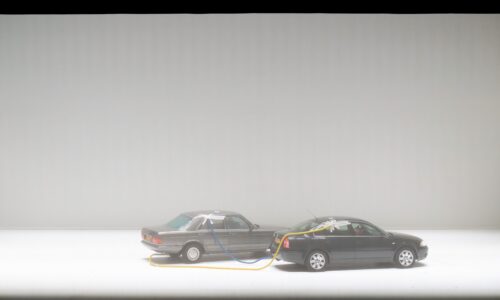The Dutch National Opera, DNO. The downfall.
In the Dutch newspaper “de Volkskrant”, critic Guido van Oorschot wrote about the Dutch National Opera’s production of Le lacrime di Eros: “This [Le lacrime di Eros] is already the third production by De Nationale Opera [DNO] this year that is substandard, after The Shell Trial and Fidelio”.
Recently there was the sordid affair of the perverted director Andriy Zholdak, who sexually groped a dancer during a rehearsal – she reported the incident to the police. DNO covered up the problem by hypocritically admitting that there had been (unsanctioned) “unacceptable, transgressive behavior by guest director Andriy Zholdak”. (Quote DNO)
Problem solved.
Zholdak was not thrown out with steam and boiling water after the disgusting incident, but remained “in office” as usual during the Fidelio series he staged with all kinds of gimmicks; at the premiere, he was able to receive the inevitable boos undisturbed while waving the Ukrainian flag and smiling broadly.

Taking responsibility? Not for Me, Myself and I
Dissatisfaction with the administrative and especially the artistic quality of the DNO policy is growing. It can be seen in the increasingly critical reviews, but also on social media, which make it easier to share information and protest against the Mona-Lisas-with-moustaches that are supposed to pass for operas; the vehement reactions are also reflected in conversations among opera lovers. These conversations include terms that we will not repeat here out of politeness, but which often begin with an “f”. The general trend is, in the most basic terms, “When will we see a normal opera again?” There is a crying need for operas that have not been taken to the Amsterdam Adaptation Factory. People have had enough of the infuriating dilettantism of the painfully failed The Shell Trial, the artistic monstrosity of Fidelio, an obvious case of label scam, and dead-on-arrival productions like Le lacrime di Eros. DNO’s meteoric decline has lost its accidental character under the reign of intendant Sophie de Lint. The misery is structural. In the undercurrent of benevolent artistic appreciation by opera audiences, De Lint is a human obstacle. On the Amstel (DNO is located on this river), the authentic and picturesque houseboats are being replaced by trailing suction hopper dredgers, cutter dredgers, backhoe dredgers and split hopper dredgers: in short, DREDGERS!
x
“We get used to singing against the music.”
Marx
The decline of DNO, via the Municipal Theatre on Amsterdam’s Leidseplein, to the Music Theatre 1 (Audi) and the Music Theatre 2 (De Lint) is deeply sad, but, with Marx in mind, must one day lead to a sweeping revolution. The Schlemperei [sloppiness] on the Amstel is undermining itself, as opera lovers increasingly realise that they are being cheated by the company ‘Trickery and Deceit”, which specialises in subsidised label fraud. The salvation of opera lovers is put to the test, until it finally leads to a revolution. A revolution!
Well, “revolution” might be a bit of an exaggeration…. More concretely, and much simpler: send De Lint back to the Swiss Alps and appoint someone with an opera mind, say Laurence Dale, as DNO Intendant. We predict a shift from obsessive wokism to a primacy of artistic quality. The DNO’s shrinking army of idolatrous followers will take a while to recover from the shock, but will soon be cheering ‘Arise, wretched of the earth!
Discontent grows. Opera audiences increasingly feel that DNO is not acting in their interests, the gap between an honest and authentic Il Trovatore and a manifestation of Rolling Party Horns led by anti-musical professors of General World Sciences is widening. We don’t want to lament again the censorship to which Opera Gazet is subjected by DNO. But the fact is that the obstruction of the freedom of the press fits perfectly into DNO’s deliberate clampdown on public consciousness. DNO enforces not only the we-decide-what-you-want-to-see rule, but also the we-decide-what-proper-journalism-is rule.

We need a sweeping revolution
Be that as it may…
DNO has lost its legitimacy under the current leadership through artistic (and managerial) failure. The last ‘Fidelio’ was no Fidelio, but a case of pure label fraud, with which DNO has severely damaged public confidence. The disorientated sex offender Andriy Zholdak should have been stoned du moment and thrown into the Amstel, instead of keeping him in the saddle with all sorts of stopgap measures, with which DNO has exposed its ideology of equal opportunities, woke, climate-friendly snacks, ‘safety’ and skull-measuring hypocrisy of the diversity ideology itself as the pseudologia fantastica of the caretaker who runs an insane asylum and goes mad because his day off brings him into a state of psychosis.
What we need in the field of opera (and in many other fields too, but that is another story) is a decisive change, a decisive cultural change. Although we prefer not to use the phrase ‘from our tax money’ for aesthetic reasons, the fact is that another Dutch opera house, the sympathetic Opera Zuid, where the madness has not struck, is being wiped out in terms of subsidies, while the subsidised Jester Festival on the Amstel is once again being generously endowed. With Dutch taxpayers’ money, that is.


Thank you for making it clear the way opera should be directed and staged!
👏👏👏👏
I just want to thank you and Opera Gazet for your constant fighting in defense of “opera as is was written”. I think opera lovers are more than fed up about the rape of texts and music committed by directors and menagers.
[…] OPERAGAZET: La Ópera Nacional Holandesa, DNO. Su caída. […]